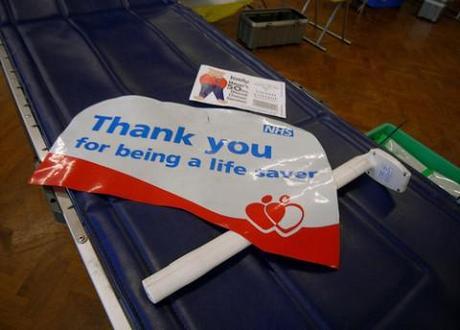
After a donation. Photo credit Steve Bowbrick http://www.flickr.com/photos/bowbrick/5522832945/sizes/m/in/photostream/
In the 1980s, at the height of the AIDS epidemic, restrictions were put on gay men who wanted to give blood, to lower risks of HIV infection. Men who had sex with men were not allowed to give blood for life.
Medical evidence now suggests that this ban is no longer needed. Though the National Blood Service tests all donated blood for HIV, there is a small time period (or “window period”) after infection, when it’s impossible to find the virus. The UK government’s Advisory Committee on the Safety of Blood, Tissues and Organs recommends that “the evidence supports a 12-month deferral period since last occurrence be introduced for men who have had oral or anal sex with another man, whether a condom or other protective was used or not”. South Africa has a six-month gap between sex and donation, and it’s a year in Australia, Sweden and Japan. Britain’s introduction of a year-long ban will be much shorter than previously thought, when a ten-year window was mooted.
Meanwhile, the UK blood cancer charity, Anthony Nolan, has called for gay and bisexual men to give blood stem cells. There’s no such ban on stem cells.
The Terrence Higgins Trust, the largest HIV and sexual health charity in the UK, says the arguments should be about public health, not discrimination, stating: “We believe any decision on the safety of the blood supply must be based on evidence and not on political lobbying or framing of it as purely an equalities issue.”
- We need more awareness. A recent House of Lords report, said The Pink News, stated that last year 3,000 gay and bisexual men were diagnosed with HIV, which is the highest number recorded. It recommended a nationwide awareness camapaign, more spending on prevention work, and specialist HIV training for medical staff. In 2010, 45 percent of those diagnosed with HIV were gay or bisexual men.
- Could do better. It’s not the best decision, said Alex Foster on Libdemvoice. It puts the NHS on the same level as the Anglican Church: gays are fine, “so long as we can be sure that you’re not actually f***ing.” A tiny amount of gays will now be able to give blood, but it’s not quite good enough – most gay men – who mostly don’t have HIV – still won’t be able to donate. This despite the fact that the Blood Service is continually looking for eligible donors.
- Don’t deny blood when it’s needed. Tom King on Labour List said the ban was “grounded purely in prejudices.” There’s no reason at all why gay and bisexual men – “who practice safe sex” – should be any threat to blood stocks. Why, for instance, aren’t straight donors asked if they’ve had unprotected sex? Why should sleeping with a prostitute be safer than being with a man? Though levels of HIV/AIDS are high amongst gay men, that shouldn’t mean “three million potentially safe blood donors should face discrimination.”
More on health
- Should gay men be allowed to give blood?
- Government u-turn on abortion
- Nurofen sabotage
- NHS systems “a waste”
- Nudged back to health?
- Should fat children go into care?
- No more padded bras for children
- Fat gene found, claim scientists
- Fat people on planes

